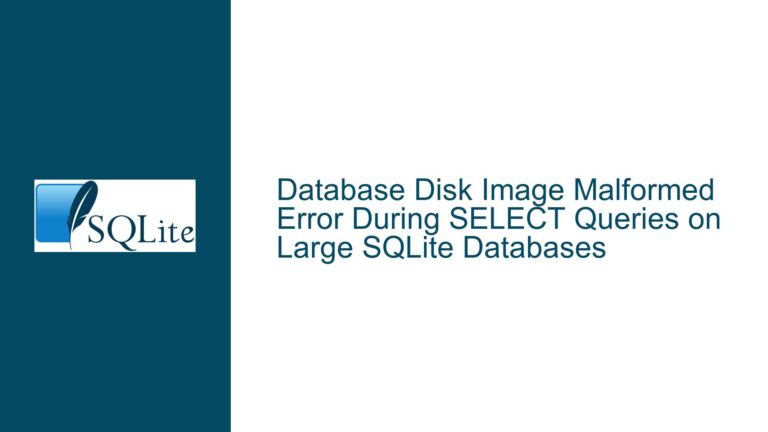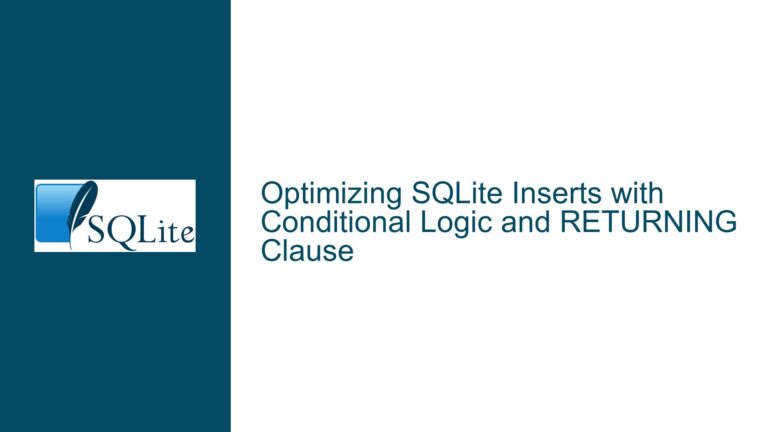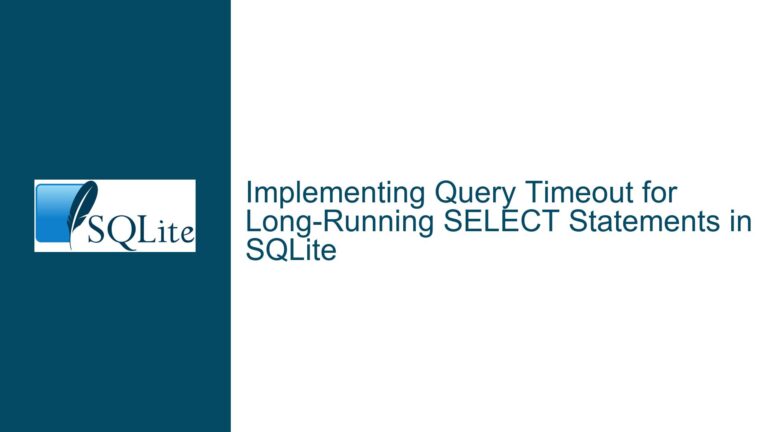Handling SQLite Identifier Quoting for Dynamic Trigger Creation
Understanding the Need for Quoting Identifiers in SQLite
When working with SQLite, particularly in scenarios involving dynamic SQL generation such as creating triggers or constructing queries programmatically, the need to properly quote identifiers becomes paramount. Identifiers in SQLite include table names, column names, and other database object names. The primary reason for quoting identifiers is to ensure that the SQL statements remain valid and executable, especially when these identifiers contain special characters, reserved keywords, or spaces.
In the context of dynamic SQL generation, such as creating triggers that reference columns of a table, the challenge is to ensure that the column names are correctly quoted to avoid syntax errors or unintended behavior. For instance, if a column name is a reserved keyword like "ORDER" or contains special characters like double quotes, failing to quote these identifiers properly can lead to invalid SQL statements.
The issue at hand revolves around the need for a function or method to quote identifiers dynamically within a TCL proc that generates SQL statements. The goal is to create a robust mechanism that can handle any valid column name, ensuring that the generated SQL is always syntactically correct.
Exploring the Limitations of Built-in Functions and Custom Solutions
SQLite provides the quote() function, which is designed to escape string literals by enclosing them in single quotes and doubling any embedded single quotes. However, this function is not suitable for quoting identifiers, as identifiers require double quotes for escaping in SQLite. The quote() function is intended for string values, not for identifiers, which necessitates a different approach.
One proposed solution involves using the replace() function in combination with quote() to transform single-quoted strings into double-quoted identifiers. This approach leverages the fact that quote() produces a single-quoted string, and replace() can then substitute single quotes with double quotes. While this method works for simple cases, it may not handle all edge cases, such as identifiers that already contain double quotes or other special characters.
Another approach involves writing a custom TCL proc to escape identifiers manually. The proposed quote-identifier proc aims to double every double quote character in the input and wrap the result in double quotes. This method is more direct and avoids the intermediate step of using quote(). However, it requires careful implementation to ensure that all edge cases are handled correctly, such as identifiers that contain backslashes or other escape characters.
Leveraging SQLite’s Format Function for Identifier Quoting
A more elegant and robust solution is to use SQLite’s built-in format function with the %w substitution type. The %w substitution is specifically designed for quoting identifiers. It automatically wraps the identifier in double quotes and escapes any embedded double quotes by doubling them. This method is both concise and reliable, as it handles all edge cases correctly without requiring custom code.
For example, consider a table with columns that have unusual names, such as an empty string or a name containing double quotes. Using the format('%w', name) approach ensures that these identifiers are correctly quoted in the generated SQL. This method is particularly useful in dynamic SQL generation scenarios, where the column names are not known in advance and must be quoted dynamically.
Implementing the Solution in a TCL Proc
To implement the solution in a TCL proc, the format function can be used within a SQL query to generate the quoted column names. The proc can then use these quoted names to construct the SQL statement for creating the trigger. This approach ensures that the generated SQL is always valid, regardless of the column names.
For instance, the proc can first retrieve the column names from the pragma_table_info table, apply the format('%w', name) function to each column name, and then use these quoted names in the trigger creation statement. This method is both efficient and reliable, as it leverages SQLite’s built-in capabilities to handle identifier quoting.
Addressing Potential Pitfalls and Edge Cases
While the format('%w', name) approach is robust, it is essential to consider potential pitfalls and edge cases. For example, if the column names are dynamically generated or come from an external source, it is crucial to validate these names to ensure they do not contain invalid characters or sequences. Additionally, when dealing with legacy databases or third-party tools, it is important to ensure that the quoting mechanism is compatible with the existing schema and conventions.
Another consideration is the performance impact of dynamic SQL generation. While the format('%w', name) approach is efficient, generating SQL statements dynamically can introduce overhead, particularly in scenarios involving large numbers of columns or frequent trigger creation. In such cases, it may be beneficial to optimize the proc by caching the quoted column names or using prepared statements.
Best Practices for Dynamic SQL Generation in SQLite
When working with dynamic SQL generation in SQLite, it is essential to follow best practices to ensure the reliability and maintainability of the code. These best practices include:
Use Built-in Functions Whenever Possible: Leverage SQLite’s built-in functions, such as
format('%w', name), to handle identifier quoting. This approach is more reliable and maintainable than custom solutions.Validate Inputs: Ensure that all inputs, such as table and column names, are validated to prevent SQL injection or other security vulnerabilities. This is particularly important when dealing with dynamic SQL generation.
Handle Edge Cases: Consider all edge cases, such as identifiers containing special characters or reserved keywords, and ensure that the quoting mechanism handles these cases correctly.
Optimize Performance: Be mindful of the performance impact of dynamic SQL generation and optimize the code to minimize overhead. This may involve caching results, using prepared statements, or other optimization techniques.
Document the Code: Clearly document the code, including the rationale for using specific functions or techniques, to ensure that other developers can understand and maintain the code.
Conclusion
Quoting identifiers in SQLite is a critical aspect of dynamic SQL generation, particularly when creating triggers or constructing queries programmatically. The format('%w', name) function provides a robust and efficient solution for quoting identifiers, handling all edge cases correctly without requiring custom code. By following best practices and considering potential pitfalls, developers can ensure that their dynamic SQL generation code is reliable, maintainable, and performant.
In summary, the key to successful dynamic SQL generation in SQLite lies in understanding the nuances of identifier quoting, leveraging built-in functions, and adhering to best practices. By doing so, developers can create robust and efficient solutions that handle all edge cases and ensure the integrity of the generated SQL statements.






